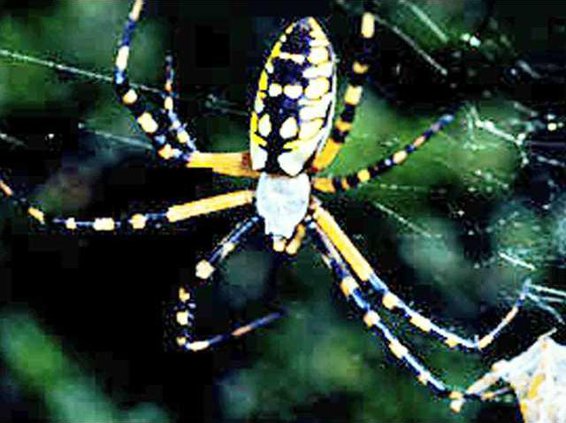Spiders, snakes and other reptiles and insects are not among the attractions that draw people to Coastal Georgia.
However, according to Georgia Department of Natural Resources and the University of Georgia Cooperative Extension, these critters very much are a part of the community and, like humans, some of them have been affected by recent rains and other environmental conditions.
Local social-media chatter has included increased reports of frog, snake and even alligator sightings. One Hinesville resident said she discovered a spider that she’s never seen before. Most people suspect heavy rains have factored into the deluge of reptile sightings as well as spiders, ticks and lovebugs.
Wildlife biologist Kara Nitschke said the DNR is not seeing or hearing of an increase in snakes or alligators, likely because the recent rains have given the animals more habitats to choose from, making them less likely to leave one pond for another — unless they’re seeking new food sources.
“On the contrary, we’ve found a decrease in snake and alligator sightings,” Nitschke said. “Last summer, we were getting several calls of alligator sightings every week. We’ve only gotten a few this year.”
She said an alligator spotted crossing Highway 196 near Gum Branch probably was looking for a better food source. They mostly feed on fish, snakes and frogs. The new ponds formed by recent rains probably don’t have any fish or an abundance of mature frogs, she said.
“The population of frogs has definitely increased because of the increase in water sources,” Nitschke said. “When these new water sources become scarce, though, frogs will congregate near remaining water sources.”
Frog-congregation points include dew-covered car windshields and the lids of trash cans, where dew has accumulated in puddles, she said.
Liberty County Cooperative Extension Agent Robert Bell said he has received a lot of questions this year about spider populations, including unusual spiders. One Hinesville resident who reported seeing a “new species” of spider with what looks like a “neon alien” on its back probably saw a yellow garden spider, Bell said.
“I don’t think we are being invaded by new species or anything, so Liberty County residents should not be alarmed,” he said. “There are (however) two species of spiders that everyone should know — the widow (black or brown) and the brown recluse.”
Bell said black-widow spiders can be identified by what looks like a red or orange hourglass on its abdomen, and a brown recluse can be identified by a violin-shaped marking on its back. He added the brown recluse has six eyes that are arranged in pairs as opposed to the eight eyes common on other spiders. He said most people — including himself — aren’t willing to get close enough to a spider to count its eyes.
There is some controversy about whether brown-recluse spiders have in fact been found in Coastal Georgia, but Bell said he never discounts sighting claims since insects often are inadvertently transported outside their native habitats. He said he could identify any unusual spider species if quality photos of it are taken at several angles.
Bell agreed that lovebugs can be a nuisance, but emphasized they are harmless. They are a type of March fly whose numbers are tied to moisture. The recent heavy rains are probably the reason so many lovebugs are out this year. Bell theorized that the absence of lightning bugs this year might be related to environmental changes.
In addition, the tick population is increasing, but not as a result of heavy rains.
“There has been an increase in tick populations, and it is directly tied to the increase in warm-blood forest animals (like deer),” Bell said. “The warmer winters we have had also contribute to the population growth. We don’t immediately notice the bites because ticks secrete small amounts of saliva that contain neurotoxins. These are nerve poisons that anesthetize the bite area.”
Because ticks are known to carry diseases, Bell said it’s wise to always check for ticks after being outdoors.
Rain bringing out the critters


Sign up for our E-Newsletters